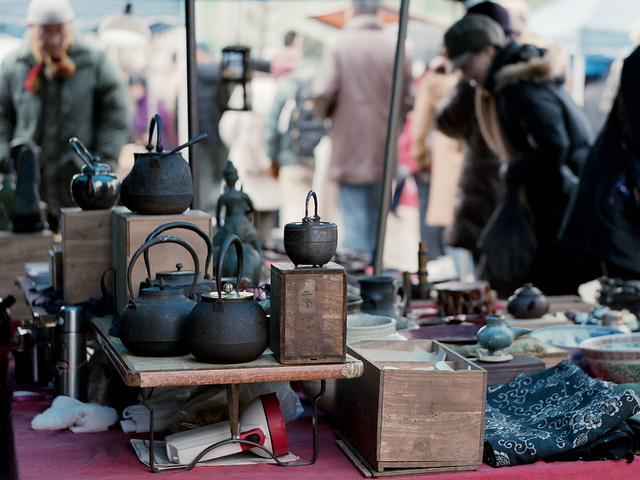May 29, 2018
Flea and antique markets in Tokyo

One of the joys of living in a different country is absorbing its culture and aesthetics. One of the best way of doing that is by filling your home with fashionable goods and furnishings that reflects both your personal taste and that of your adopted country.
Now, to do this in Tokyo you can of course head to any one of the countless department and interior design stores. However a more interesting, culturally representative, and let’s face it, more fun thing to do is to have a browse around flea markets and antique stores.
Tokyo is awash with these havens of good (and, of course, bad) taste, and within them you can find all manner of interesting pieces with which to liven up your home. There are plenty of bargains to be found, so get hunting!
Akasaka Antique Market in Ark Hills
The Akasaka Antique Market in Ark Hills is perhaps the most upscale of its kind in the city. You can find private antique dealers next to trendy clothing brands, and everything from furniture to jewelry.
- Where: 1-12-32 Akasaka, Minato-ku
- When: Last sunday of the month
- Contact: www.arkhills.com
Heiwajima Antique Fair
Not the most regular of markets, the Heiwajima Antique fair is on just five times a year, but claims to be the oldest of its kind in Japan. When it does roll into town, there are 280 dealers from all over the country. Expect nick-nacks, pottery and all kinds of unusual pieces.
- Where: Ryutsu Center Building, 2F
- When: Three days, five times a year. The next one is 16, 17 and 18 September, 2016
- Contact: www.kottouichi.com
Oi Racecourse Flea Market
With around 300 vendors, the flea market at Oi Racecourse is is one of the biggest in the city. It is also one of the most regular. You can find a wide range of products from full-time vendors, ranging from the mundane to the collector’s items.
- Where: Tokyo City Keiba, 2-1-2 Katsushima, Shinagawa-ku
- When: Every Saturday and Sunday
- Contact: https://mfmf.trx.jp/
Best Flea Market
Held by the Tokyo International Forum on the first Sunday of each month, there are over 200 stalls at the Best Flea Market (their name, not mine). Most are manned by creatives who are selling their one off pieces. Great for something really original that you definitely wouldn’t find in IKEA.
- Where: Tokyo International Forum, 3-5-1 Marunouchi, Chiyoda-ku
- When: One Sunday each month. See website for details.
- Contact: www.t-i-forum.co.jp/event/antique
Yasukuni Shrine Market
Though Yasukuni Shrine is a little bit of controversial shrine (it commemorates the Japanese war dead, including war criminals) the market it one of the best known in the city. If you’re looking for antiques and pottery, this is the place to go.
- Where: Yasukuni Shrine, 3 Chome-1-1 Kudankita, Chiyoda
- When: Two Saturdays a month. See website for details.
- Contact: www.kankyo.o.oo7.jp
Flea market language
Haggling isn’t as readily acceptable in Japan as some other Asian countries. With that said, in the world of the flea market so the rules are slightly different. Below are a few language tips you can use in the flea market to hopefully make your bargain hunting that little bit cheaper. Just remember, this isn’t a Marrakesh Souk or a New Delhi market, so if you are going to try to barter, do so with a smile on your face, and if the store owner isn’t into it, accept gracefully.
- Ikura desu ka? – How much is this?
- XXXX en, dou desu ka? – Would you accept XXX yen?
- Anatano saikōno kakaku to iu koto desu ka? – Is that your best price?
- Yasuku naranai? – Can you make it any cheaper?
- Takai desu ne? – It’s a bit expensive, isn’t it?
- Ni/san/yon/go-ko kattara, waribiki arimasu ka? – If I buy two/three/four/five, is there a discount?
Mark Guthrie
Photo: flickr.com “20131221 Antique and Flea Market in Toji-Temple [ Kyoto, JP ] | 京都・東寺 弘法市(骨董市) To-ji Temple Kobo ichi Market [ Kyoto,JP ]” by peter-rabbit (CC BY-SA 2.0) -Modified


About the author